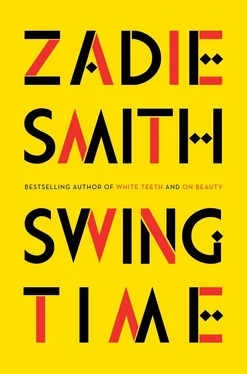But now I felt defended, virtually surrounded. No, I didn’t feel like stopping. I kept refreshing and refreshing, waiting for new countries to wake up and see the images and form their own opinions or feed off opinions already voiced. In the wee hours I heard the front door squeak and Fern stumbling into the apartment, surely straight from the after-party. I didn’t move. And it must have been at about four in the morning, while scrolling through the fresh opinions and listening to the birds chirp in the dogwood, that I saw the handle “Tracey LeGon,” the subtitle “Truthteller.” My contact lenses were brittle in my eyes, it hurt to blink, but I wasn’t seeing things. I clicked. She’d posted the same photo I’d seen hundreds of times by then — Aimee, the dancers, Lamin, the children — all lined up at the front of the stage, wearing the adinkra cloth for which I’d seen them fitted: a rich cerulean blue printed with a pattern of black triangles, and in each triangle there was an eye. Tracey had taken this image, expanded it many times, cropped it, so only the triangle and the eye were still visible, and underneath this image she asked the question: LOOK FAMILIAR?
Three
Returning with Lamin, we took the jet, but without Aimee — who was in Paris, being awarded a medal by the French government — and so had to process through the main airport, just like everybody, into an arrival hall packed with returning sons and daughters. The men wore fancy jeans of heavy denim, stiff, patterned shirts with stockbroker collars, branded hooded tops, leather jackets, the latest sneakers. And the women were likewise determined to wear all of their best things at the same time. Hair beautifully done, nails freshly painted. Unlike us, they were all familiar with this hall, and quickly secured the services of the porters, to whom they handed their mammoth suitcases, instructing them to take care — though each bag was wrapped in layers of plastic — before leading these hot and harassed young baggage carriers through the crowds toward the exit, turning back every now and then to bark instructions like mountain climbers with their Sherpas. This way, this way! Smartphones held up above their heads, indicating the route. Looking at Lamin in this context, I realized his traveling outfit must be a deliberate choice: despite all the clothes and rings and chains and shoes Aimee had given him this past month, he was dressed exactly as he had been when he left. Same old white shirt, the chinos and a simple pair of leather sandals, black and worn thin at the heel. It made me think there were things about him I had not understood — maybe many things.
We took a taxi and I sat with Lamin in the backseat. The car had three broken windows and a hole in the lower carriage through which I could see the road rolling beneath. Fern sat in the front, next to the driver: his new policy was to keep a cool distance from me at all times. On the jet he read his books and journals, in the airport he restricted himself to practical matters, get that trolley, join that queue. He was never mean, never said anything cruel, but the effect was isolating.
“Want to stop to eat?” he asked me now, by way of the rearview mirror. “Or you can wait?”
I wanted to be the kind of person who didn’t mind skipping lunch, who could power through, like Fern often did, replicating the practice of the poorest families in the village by eating only once, in the late afternoon. But I was not that kind of person: I couldn’t miss a meal without getting aggravated. We drove for forty minutes and stopped at a roadside café opposite something called the American College Academy. It had bars on its windows and half the letters missing from the sign. Inside the café the menus depicted glistening American-style meals “with fries,” the prices of which Lamin read aloud, shaking his head gravely, as if encountering something deeply sacrilegious or offensive, and after a long conversation with the waitress three plates of chicken yassa arrived for a negotiated “local” rate.
We were bent over our food, eating in silence, when we heard a booming voice coming from the very back of the café: “My boy Lamin! Little brother! It’s Bachir! Over here!”
Fern waved. Lamin did not move: he had spotted this Bachir long ago and had been praying not to be spotted in return. I turned and saw a man sitting alone at the last table near the counter, in the shadows, the only other customer in the place. He was broad and muscular like a rugby player, and wore a dark blue suit with stripes, a tie, a tiepin, loafers without socks and a thick gold chain around his wrist. The suit was straining against his muscles and his face was running with sweat.
“He is not my brother. He is my age mate. He is from the village.”
“But aren’t you going to—”
Bachir was already upon us. Up close, I saw he was wearing a headset, consisting of earpiece and microphone, not unlike the kind Aimee wore on stage, and in his arms carried a laptop, a tablet and a very large phone.
“Gotta find a place to put all this stuff!” But he sat down with us still clasping it all to his chest. “Lamin! Little brother! Long time!”
Lamin nodded at his lunch. Fern and I introduced ourselves and received firm, painful, damp handshakes.
“Me and him grew up together, man! Village life!” Bachir grabbed Lamin’s head and put him in a sweaty headlock. “But then I had to go to the city, baby, know what I’m saying? I was chasing the money, baby! Working with the big banks. Show me the money! Babylon for real! But I’m still a village boy at heart.” He kissed Lamin and released him.
“You sound American,” I said, but that was only one thread of the rich tapestry of his voice. Many different movies and adverts were in there, and a lot of hip-hop, Esmeralda and As the World Turns , the BBC news, CNN, Al Jazeera and something of the reggae that you heard all over the city, from every taxi, market stall, hairdresser. An old Yellowman tune was playing right now, from the tinny speakers above our heads.
“For real, for real…” He rested his very large, square head on his fist in a thoughtful pose. “You know, I’ve not actually been to the US as yet, not as yet. Got a lot going on. It’s all happening. Talking, talking, gotta keep up with technology, gotta keep relevant. Look at this girl: she is ringing my number, baby, night and day, day and night!” He flashed me an image on his tablet, of a beautiful woman with a glossy weave and dramatic lips painted a deep purple. It looked to me to be a commercial image. “These big-city girls, they’re too crazy! Oh, little brother, I need an upriver girl, I want to start a nice family. But these girls don’t even want a family any more! They’re crazy! How old are you, though?”
I told him.
“And no babies? Not even married? No? OK! OK, OK… I feel you, sister, I feel you: Miss Independent, is it? That’s your way, OK. But for us, a woman without children is like a tree without fruit. Like a tree”—he raised his muscular backside half out of his chair in a squat, stretched his arms like branches and his fingers like twigs—“without fruit.” He sat back down and closed his hands back into fists. “Without fruit,” he repeated.
For the first time in many weeks Fern managed a half-smile in my direction.
“I think what he is saying is that you are like a tree—”
“Yes, Fern, I got it, thank you.”
Bachir spotted my flip-phone, my personal phone. He picked it up and turned it over in his palm with exaggerated wonder. His hands were so big it looked a child’s toy.
“This is not yours. Serious? This is yours?! This is what they are using in London? HA HA HA. Oh man, we more fresh over here! Oh, man! Funny, funny. I would not have expected this. Globalization, right? Strange times, strange times!”
Читать дальше












